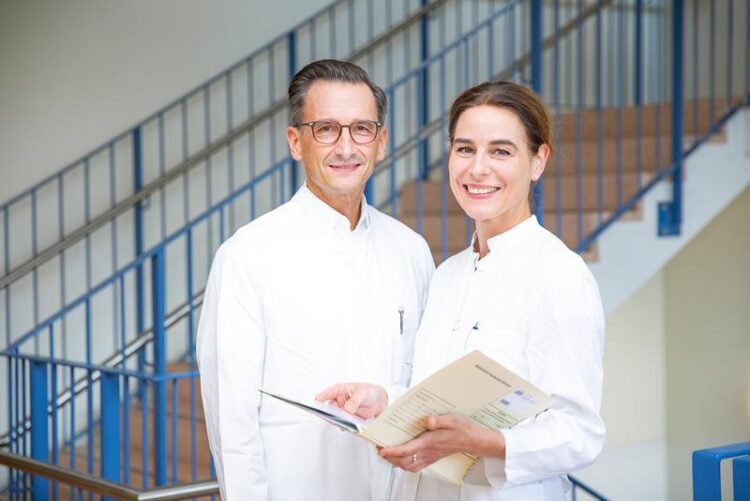Fatty liver is increasingly the cause of liver cell cancer

Have produced an up-to-date review on hepatocellular carcinoma: Professor Dr. Arndt Vogel and private lecturer Dr. Anna Saborowski.
Copyright: Karin Kaiser / MHH
MHH research team has published current review on hepatocellular carcinoma (HCC) in The Lancet.
Hepatocellular carcinoma (HCC) is one of the most common cancers worldwide. In Germany, there are currently around 9,000 new HCC diagnoses per year, and almost 8,000 people affected do not survive the disease. Before the tumour develops in the liver, the organ is often already damaged by chronic inflammation. The “traditional” causes of chronic liver damage include, in particular, infections with hepatitis viruses or excessive alcohol consumption. In the meantime, however, obesity and metabolic diseases, which include diabetes mellitus and lead to a so-called fatty liver, are becoming increasingly important.
These epidemiological developments have been traced by an international research team led by Professor Dr. Arndt Vogel and Private Lecturer (PD) Dr. Anna Saborowski from the Clinic for Gastroenterology, Hepatology and Endocrinology at the Hannover Medical School (MHH). They reviewed around 200 international studies and compiled an up-to-date overview of risk factors, diagnosis and treatment of hepatocellular carcinoma. The work has been published in The Lancet, the world’s most important medical journal.
Proportion of virally caused HCC cases decreases
“Non-alcoholic fatty liver disease is increasing significantly and is becoming a major cause of hepatocellular carcinoma,” notes Professor Vogel. Due to poor nutrition and lack of exercise, the number of extremely overweight people who develop a fatty liver is increasing. It is true that the risk for individuals to develop cancer later on is relatively low. But the widespread disease of obesity and the resulting increase in the number of people with fatty liver increases the absolute number of cancer cases. “The proportion of viral liver cancers, on the other hand, has decreased thanks to vaccinations against hepatitis B and successful treatment of hepatitis C,” explains the gastroenterologist.
However, not only the epidemiology of liver cancer has changed. The treatment options for HCC have also evolved since the last Lancet review four years ago. “For a long time, there were only a few therapeutic options for patients with advanced tumour stages,” explains PD Dr. Saborowski. In the meantime, however, a whole range of options is available for systemic therapy. On the one hand, special drugs are used that intervene in the signalling pathways for tumour growth. On the other hand, the big breakthrough was achieved with the introduction of the so-called immune checkpoint inhibitors. These active substances activate the immune system so that cancer cells are recognised and fought. With the staggered use of the different drugs, the prognosis of patients with HCC can be significantly improved.
Treatment in specialised centres recommended
One problem remains that liver cancer is often diagnosed late because of its non-specific symptoms. “There is a lack of biomarkers with which we can not only identify patients at risk, but also make precise treatment decisions for all stages of hepatocellular carcinoma,” says Professor Vogel. However, it is crucial for the success of the therapy that HCC patients are treated where the entire spectrum of diagnostic and therapeutic options, including liver transplantation, interventional local procedures and systemic therapies, are offered. And this is only offered by specialised facilities such as the Visceral Oncology Centre of the MHH, emphasises the liver cancer expert. “In our tumour conferences, doctors from different disciplines work together and draw up a joint therapy plan, review it regularly and decide what is best for the patient in each situation.”
SERVICE:
For more information, contact Professor Dr Arndt Vogel, vogel.arndt@mh-hannover.de, telephone (0511) 532-9590.
A summary of the original paper “Hepatocellular carcinoma” can be found here:
https://pubmed.ncbi.nlm.nih.gov/36084663/
Media Contact
All latest news from the category: Health and Medicine
This subject area encompasses research and studies in the field of human medicine.
Among the wide-ranging list of topics covered here are anesthesiology, anatomy, surgery, human genetics, hygiene and environmental medicine, internal medicine, neurology, pharmacology, physiology, urology and dental medicine.
Newest articles

Innovative 3D printed scaffolds offer new hope for bone healing
Researchers at the Institute for Bioengineering of Catalonia have developed novel 3D printed PLA-CaP scaffolds that promote blood vessel formation, ensuring better healing and regeneration of bone tissue. Bone is…

The surprising role of gut infection in Alzheimer’s disease
ASU- and Banner Alzheimer’s Institute-led study implicates link between a common virus and the disease, which travels from the gut to the brain and may be a target for antiviral…

Molecular gardening: New enzymes discovered for protein modification pruning
How deubiquitinases USP53 and USP54 cleave long polyubiquitin chains and how the former is linked to liver disease in children. Deubiquitinases (DUBs) are enzymes used by cells to trim protein…



